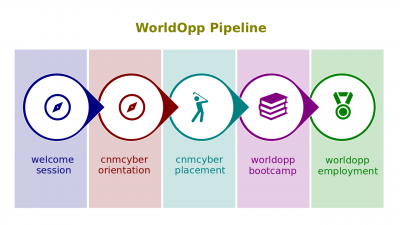Task Attributes
Task Attributes (hereinafter, the Lectio) is the second lesson part of the Nature of Work lesson that introduces its participants to work characteristics and related topics.
This lesson belongs to the Introduction to Employment session of EmployableU Concepts.
Content
The predecessor lectio is Job Dimensions.
Script
- Job tasks are not created equal. So are work demands and resources to handle them.
- Some job assignments are more formalized, some are less. The degree of that formalization is known as task structure. Structured tasks come with predetermined objectives, priorities, and procedures. Unstructured tasks require employees to take risks and make their own decisions.
- Work demands are responsibilities, pressures, obligations, and even uncertainties that individuals face in the workplace. High demands often impose high psychological stress on the worker and require stronger stress coping skills.
- Time pressure is probably the most recognizable among these demands. This pressure refers to meeting strict deadlines and, as the result, emergency work schedules.
- Competitive pressures are another example of the demands. Level of competition refers to the extent to which the task require the worker to compete or to be aware of competition.
- Other task attributes that are worthy to be mentioned include frequency of decision-making, importance of being accurate, importance of repeating same tasks, and consequence of error. Workplace conditions are a separate source of work demands.
Key terms
- Job task, task structure, structured task, unstructured task, task attribute, consequence of error,freedom to make decisions, frequency of decision-making, impact on enterprise, importance of being accurate, importance of repeating same tasks, level of competition, time pressure, work schedule
Closing
- Are you best at structured tasks, unstructured ones, or both? --Yes/No/Let's move on for now
Workplace Conditions is the successor lectio.
Questions
Placement entrance exam
- "Error" questions:
- In one's job, consequence of error refers (or does not refer) to seriousness of the consequences of a mistake that cannot be corrected.
- In one's job, consequence of error refers (or does not refer) to how automated the job is.
- In one's job, consequence of error refers (or does not refer) to how much the job offers decision making freedom and work under little-to-no supervision.
- In one's job, consequence of error refers (or does not refer) to how frequently the worker is required to make decisions that affect other people, the financial resources, and/or the image and reputation of the organization.
- In one's job, consequence of error refers (or does not refer) to the effect of the worker's decisions on co-workers and/or organizational results.
- In one's job, consequence of error refers (or does not refer) to the importance of being very exact or highly accurate in performing the job.
- In one's job, consequence of error refers (or does not refer) to the extent this job require the worker to compete or to be aware of competitive pressures.
- Consequence of error (or does not assume) the worker determining his or her tasks, priorities, and goals.
- In one's job, consequence of error refers (or does not refer) to the frequency of meeting strict deadlines.
- Consequence of error refers (or does not refer) to the degree to which work is done remotely rather than at some specific physical location.
- Employees should (not) avoid mistakes at all costs.
- Consequence of error is (not) a structural job characteristic.
- "Pressure" questions:
- In one's job, time pressure refers (or does not refer) to the frequency of meeting strict deadlines.
- Time pressure is (not) a structural job characteristic.
